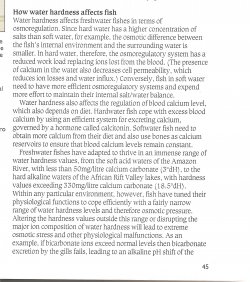https://www.aquariumnexus.com/best-molly-fish-tank-mates/ just had a read of this since im on my PC looking for answers etc and this site says that they are fine to be tank mates? (neons and harleys)There is no compromise. It would be best to rehome the mollies. They arent compatible.
If you stick with soft water you have way more options than if you harden the water.
-
Guest, the Tank of the Year contest is underway!
💧 Which tank will win? 👉 View the entries and vote now!!
You are using an out of date browser. It may not display this or other websites correctly.
You should upgrade or use an alternative browser.
You should upgrade or use an alternative browser.
completely new to fishie world
- Thread starter gaz-man
- Start date
Neons are harlequin rasboras are. Mollies and guppies csnt go with the because of the different water requirements. Temperament wise they can go with mollies but not of you want them all to be healthy. You can have either soft water fish or hard water fish. Not bothhttps://www.aquariumnexus.com/best-molly-fish-tank-mates/ just had a read of this since im on my PC looking for answers etc and this site says that they are fine to be tank mates? (neons and harleys)
Neons are harlequin rasboras are. Mollies and guppies csnt go with the because of the different water requirements. Temperament wise they can go with mollies but not of you want them all to be healthy. You can have either soft water fish or hard water fish. Not both
taken from this site https://www.fishkeepingworld.com/molly-fish/
A tropical fish like this needs a heater in the tank to maintain temperatures of 72-78°F. Keep pH between 6.7 and 8.5, and hardness between 20-30 KH.
There are 2 widely used scales. Your water at 40ppm equates to less than 2.5 degrees - which is the scale used in that recommendation.taken from this site https://www.fishkeepingworld.com/molly-fish/
However there are far more fish in the industry that require soft water than hard. I have to use RO water to get to what comes out of your tap naturally. I have 3 tanks, all filled with different fish that all need soft water. Many (including me) are really envious of what comes out of your tap. There is a whole world of tetras, rasboras, danios, corydoras, loaches and many many more that will thrive in your water.
FishkeeperLinz
Fish Crazy
taken from this site https://www.fishkeepingworld.com/molly-fish/
There is a lot of misinformation online.
It's all to do with the way hardwater and softwater fish regulate the salts and minerals. Hardwater fish need to get them directly from the water. Softwater fish store them. (I think that's right. It's a bit early for a biology lesson).
You may find this link informative;
If you wish to keep the mollies, set up a second tank and add either some crushed coral to the filter, or some substrate designed for Malawi cichlids
That link seems broken. I know @Byron has explained this mechanism several times on this site. Hopefully he reads this and has the explanation to hand to do a copy/paste. It is indeed about how the fish regulate the minerals.You may find this link informative;
FishkeeperLinz
Fish Crazy
That link seems broken. I know @Byron has explained this mechanism several times on this site. Hopefully he reads this and has the explanation to hand to do a copy/paste. It is indeed about how the fish regulate the minerals.
Huh. That's strange. I'll try quoting it:
Consequences of putting a hard water fish in soft water.
It is a paradox that while a few hard water fishes can adapt to live in soft water, most of the hard water fishes often fail to thrive in soft water and the more acidic conditions. Soft water contains few dissolved minerals, thus the alkalinity reverse is very low. It shows faster and more severe drops in pH, unlike hard water. It is worse to have wild pH swings than it is to have a pH that is not ideal.
Fish which are not adaptable to the rapid changes in pH, or if the pH drops below 6.0, can result in the damage of gills and skin, respiration problems, and ultimately death. Plus the soft water is deficient in many minerals and if the particular hard water fish fails to get them, it may lead to their health degradation, so an addition of mineral supplements may need to be done.
Consequences of putting a soft water fish in hard water.
For the small fish which are adapted to live in the soft water conditions, it is possible that when they come in contact with the minerals in hard water they may suffer from blockages in some organs and damaged kidneys. Since they fail to adapt to the hardness of the water and the many types of minerals they fail to breed and their life span gets reduced. Although depending on the species of the fish, many of them might adapt to the hardness but successful breeding won’t happen as the thick egg shells won’t adapt to hard water.
Therefore, it is crucial to know the type of water conditions which are optimum for the fishes you breed and to maintain these conditions for their healthy survival. When setting up a community tank pay close attention to the water hardness requirements and choose fish with similar needs. Simple details like these can make a huge difference between keeping fish and having fish that thrive.
By Jagriti Gulyani
Similar threads
- Replies
- 90
- Views
- 3K



